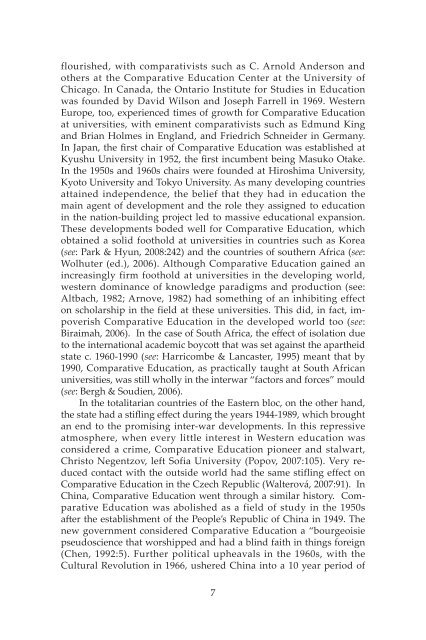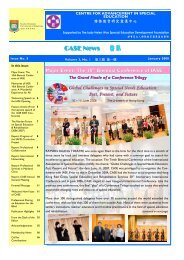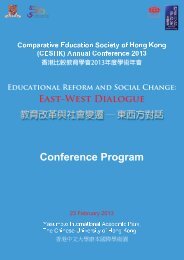Comparative Education Bulletin - Faculty of Education - The ...
Comparative Education Bulletin - Faculty of Education - The ...
Comparative Education Bulletin - Faculty of Education - The ...
You also want an ePaper? Increase the reach of your titles
YUMPU automatically turns print PDFs into web optimized ePapers that Google loves.
flourished, with comparativists such as C. Arnold Anderson and<br />
others at the <strong>Comparative</strong> <strong>Education</strong> Center at the University <strong>of</strong><br />
Chicago. In Canada, the Ontario Institute for Studies in <strong>Education</strong><br />
was founded by David Wilson and Joseph Farrell in 1969. Western<br />
Europe, too, experienced times <strong>of</strong> growth for <strong>Comparative</strong> <strong>Education</strong><br />
at universities, with eminent comparativists such as Edmund King<br />
and Brian Holmes in England, and Friedrich Schneider in Germany.<br />
In Japan, the first chair <strong>of</strong> <strong>Comparative</strong> <strong>Education</strong> was established at<br />
Kyushu University in 1952, the first incumbent being Masuko Otake.<br />
In the 1950s and 1960s chairs were founded at Hiroshima University,<br />
Kyoto University and Tokyo University. As many developing countries<br />
attained independence, the belief that they had in education the<br />
main agent <strong>of</strong> development and the role they assigned to education<br />
in the nation-building project led to massive educational expansion.<br />
<strong>The</strong>se developments boded well for <strong>Comparative</strong> <strong>Education</strong>, which<br />
obtained a solid foothold at universities in countries such as Korea<br />
(see: Park & Hyun, 2008:242) and the countries <strong>of</strong> southern Africa (see:<br />
Wolhuter (ed.), 2006). Although <strong>Comparative</strong> <strong>Education</strong> gained an<br />
increasingly firm foothold at universities in the developing world,<br />
western dominance <strong>of</strong> knowledge paradigms and production (see:<br />
Altbach, 1982; Arnove, 1982) had something <strong>of</strong> an inhibiting effect<br />
on scholarship in the field at these universities. This did, in fact, impoverish<br />
<strong>Comparative</strong> <strong>Education</strong> in the developed world too (see:<br />
Biraimah, 2006). In the case <strong>of</strong> South Africa, the effect <strong>of</strong> isolation due<br />
to the international academic boycott that was set against the apartheid<br />
state c. 1960-1990 (see: Harricombe & Lancaster, 1995) meant that by<br />
1990, <strong>Comparative</strong> <strong>Education</strong>, as practically taught at South African<br />
universities, was still wholly in the interwar “factors and forces” mould<br />
(see: Bergh & Soudien, 2006).<br />
In the totalitarian countries <strong>of</strong> the Eastern bloc, on the other hand,<br />
the state had a stifling effect during the years 1944-1989, which brought<br />
an end to the promising inter-war developments. In this repressive<br />
atmosphere, when every little interest in Western education was<br />
considered a crime, <strong>Comparative</strong> <strong>Education</strong> pioneer and stalwart,<br />
Christo Negentzov, left S<strong>of</strong>ia University (Popov, 2007:105). Very reduced<br />
contact with the outside world had the same stifling effect on<br />
<strong>Comparative</strong> <strong>Education</strong> in the Czech Republic (Walterová, 2007:91). In<br />
China, <strong>Comparative</strong> <strong>Education</strong> went through a similar history. <strong>Comparative</strong><br />
<strong>Education</strong> was abolished as a field <strong>of</strong> study in the 1950s<br />
after the establishment <strong>of</strong> the People’s Republic <strong>of</strong> China in 1949. <strong>The</strong><br />
new government considered <strong>Comparative</strong> <strong>Education</strong> a “bourgeoisie<br />
pseudoscience that worshipped and had a blind faith in things foreign<br />
(Chen, 1992:5). Further political upheavals in the 1960s, with the<br />
Cultural Revolution in 1966, ushered China into a 10 year period <strong>of</strong><br />
7
















